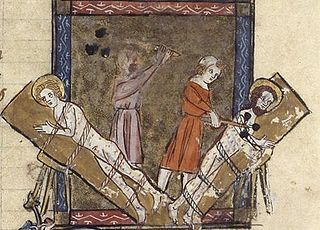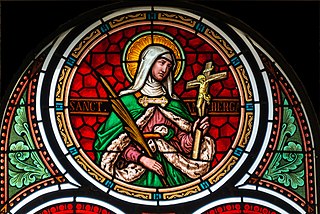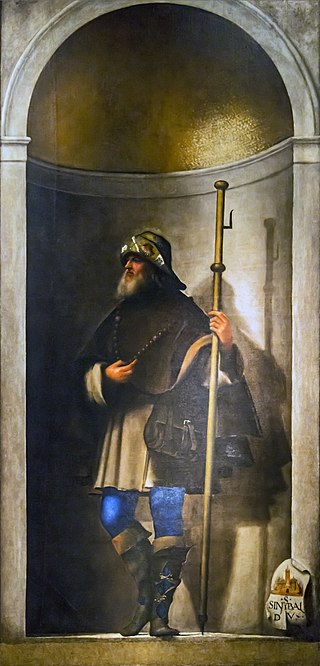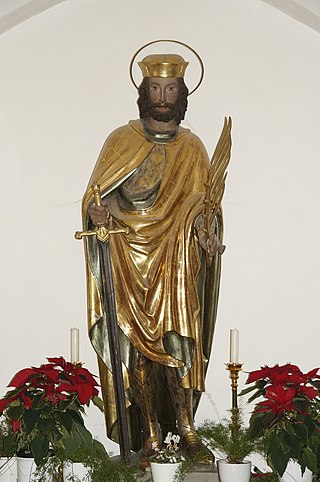
Boniface was an English Benedictine monk and leading figure in the Anglo-Saxon mission to the Germanic parts of Francia during the eighth century. He organised significant foundations of the church in Germany and was made bishop of Mainz by Pope Gregory III. He was martyred in Frisia in 754, along with 52 others, and his remains were returned to Fulda, where they rest in a sarcophagus which remains a site of Christian pilgrimage.

Walpurgis Night, an abbreviation of Saint Walpurgis Night, also known as Saint Walpurga's Eve and Walpurgisnacht, is the eve of the Christian feast day of Saint Walpurga, an 8th-century abbess in Francia, and is celebrated on the night of 30 April and the day of 1 May. This feast commemorates the canonization of Saint Walpurga and the movement of her relics to Eichstätt, both of which occurred on 1 May 870.

Walpurga or Walburga was an Anglo-Saxon missionary to the Frankish Empire. She was canonized on 1 May c. 870 by Pope Adrian II. Saint Walpurgis Night is the name for the eve of her feast day in the Medieval period, which coincided with May Day; her feast is no longer celebrated on that day, but the name is still used for May Eve.

Donar's Oak was a sacred tree of the Germanic pagans located in an unclear location around what is now the region of Hesse, Germany. According to the 8th century Vita Bonifatii auctore Willibaldo, the Anglo-Saxon missionary Saint Boniface and his retinue cut down the tree earlier in the same century. Wood from the oak was then reportedly used to build a church at the site dedicated to Saint Peter. Sacred trees and sacred groves were widely venerated by the Germanic peoples.

July 6 - Eastern Orthodox Church calendar - July 8

Gervasius and Protasius are venerated as Christian martyrs, probably of the 2nd century. They are the patron saints of Milan and of haymakers and are invoked for the discovery of thieves. Their feast day in the Latin Rite of the Catholic Church is 19 June, the day marking the translation of their relics. In the Eastern Orthodox Church and in the Eastern Rites of the Catholic Church, their feast takes place on 14 October (O.S.)/24 October (N.S.), the traditional day of their death. In Christian iconography their emblems are the scourge, the club and the sword.
In addition to Quadratus of Athens, there are several Christian saints with the name Quadratus :

Willibald was an 8th-century bishop of Eichstätt in Bavaria.

Saint Amalberga of Maubeuge was a Merovingian nun and saint who lived in the 7th century.

Hygeburg, also Hugeburc, Hugeberc, Huneberc or Huneburc, was an Anglo-Saxon nun and hagiographer at the Alemannian monastery of Heidenheim. She is "the first known Englishwoman to have written a full-length literary work" and "the only woman author of a saint's life from the Carolingian period".

Winibald was abbot of the Benedictine double monastery of Heidenheim am Hahnenkamm. Traditionally, he is called the brother of Willibald and Walpurga.

Sebaldus was an Anglo-Saxon missionary to Germany in the 9th or 10th century. He settled down as a hermit in the Reichswald near Nuremberg, of which city he is the patron saint.

Castulus is venerated as a martyr and saint. According to tradition, he was the chamberlain of Emperor Diocletian and the husband of Irene of Rome.
Saint Amelberga of Susteren was the Benedictine abbess of Susteren Abbey, Netherlands in the 9th century AD; she died about 900 AD. Her remains are kept in the former abbey church in Susteren, which was dedicated to her in the 19th century. Her feast is celebrated on November 21.

Richard the Pilgrim or Richard of Wessex was an English nobleman and Christian saint. He was the husband of Wuna of Wessex and the father of the West Saxon saints Willibald, Winnibald, and Walpurga. He led his family on a pilgrimage to the Holy Land but died en route in Lucca, where he was buried in the church of Saint Fridianus.
Eoban was a companion of St. Boniface, and was martyred with him on his final mission. In Germany, he is revered as a bishop and martyr.

Cwenburh of Wimborne was an 8th-century Anglo-Saxon saint, a sister of King Ine of Wessex and of Saint Cuthburh. Her sister Cuthburh was married to King Aldfrith of Northumbria and then became the first abbess of Wimborne monastery.
Kunigunde of Rapperswil was a Christian saint. In Old High German her name means fighter for her clan.
Wuna, or Djerimanga, is an indigenous Australian people.














